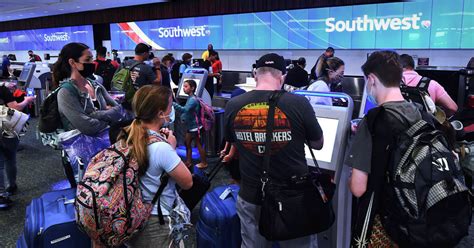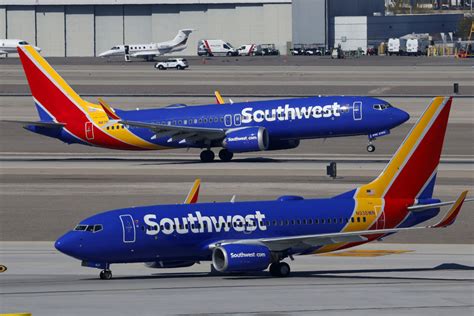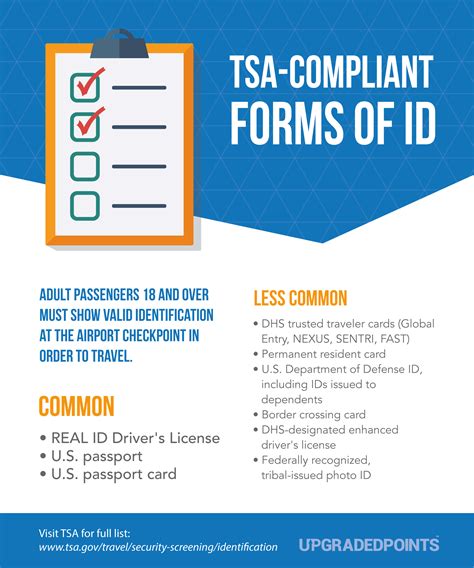
Southwest Airlines passengers are expressing widespread frustration and anger over a recently implemented boarding policy change that is causing significant travel disruptions and confusion. The alteration, which prioritizes passengers who pay extra for “EarlyBird Check-In” or upgraded “Business Select” fares, has left many feeling penalized and has sparked accusations of unfair practices.
The core of the issue lies in Southwest’s historically unique boarding process, which for decades has been based on first-come, first-served within boarding groups assigned 24 hours prior to departure. Passengers have long appreciated the airline’s absence of assigned seating, allowing them to choose their preferred spot upon boarding. However, the growing popularity and promotion of “EarlyBird Check-In” and “Business Select,” coupled with reports of technical glitches and inconsistent enforcement, are now disrupting this established system.
“It’s creating chaos at the gate,” says frequent Southwest flyer, Emily Carter. “People are confused about who gets to board when, and it feels like those of us who don’t pay extra are being pushed to the back of the line, even if we checked in right at the 24-hour mark.”
The new dynamic essentially creates a multi-tiered boarding system where those who pay more receive preferential treatment, undermining the perceived fairness of Southwest’s original model. Passengers are reporting longer lines, increased competition for overhead bin space, and a general sense of anxiety and frustration surrounding the boarding process.
The airline defends the changes as a way to offer customers more options and flexibility. Southwest spokesperson, Linda Green, stated, “We are always looking for ways to improve the customer experience, and these options provide added convenience and benefits for those who choose to utilize them.” However, this justification has done little to quell the rising tide of discontent.
One significant point of contention is the perceived lack of transparency regarding the likelihood of securing a favorable boarding position without paying extra. Many passengers report meticulously setting alarms to check in exactly 24 hours before their flight, only to find themselves assigned to the C boarding group, which guarantees a less desirable seat or potential separation from travel companions. This has led to accusations of Southwest “gaming” the system to incentivize the purchase of add-ons.
The issues also extend beyond boarding order. Passengers are reporting increased difficulty finding available overhead bin space, particularly those boarding later. This often results in gate agents requiring passengers to check their carry-on luggage, adding further delays and inconvenience to the travel experience. This is a significant pain point, as Southwest boasts free checked bags as a benefit.
Social media platforms are flooded with complaints and anecdotes of negative experiences. Passengers are using hashtags like #SouthwestFail and #BoardingGateNightmare to share their stories and express their dissatisfaction. Many are threatening to switch to competing airlines, citing a decline in customer service and value for money.
The timing of these changes is particularly sensitive, as the airline is still working to restore its reputation following a significant operational meltdown in December 2022, which left thousands of passengers stranded and caused widespread travel disruptions. The recent boarding policy changes appear to be further eroding customer trust and confidence in the airline.
Moreover, the altered boarding procedure has disproportionately impacted families traveling with young children and individuals with disabilities who previously relied on the airline’s generally accommodating approach. While Southwest states that families with children aged six and under can still board during family boarding, many report inconsistent enforcement of this policy, leading to confusion and frustration.
The airline’s historical emphasis on customer loyalty and a fun, friendly travel experience is now being called into question. Passengers are increasingly viewing Southwest as prioritizing revenue generation over customer satisfaction, potentially jeopardizing its long-standing reputation as a reliable and affordable airline.
Adding to the complexity, technical glitches in Southwest’s check-in system have been reported, further exacerbating the problems. Some passengers claim to have experienced difficulties accessing their boarding passes or receiving incorrect boarding group assignments. These technical issues contribute to the overall sense of disarray and undermine the airline’s efforts to implement the new boarding policy smoothly.
The impact extends beyond individual travelers, as businesses that rely on Southwest for employee travel are also expressing concerns. The increased uncertainty and potential for delays associated with the new boarding process can disrupt business schedules and impact productivity.
The airline’s response to the criticism has been largely defensive, with representatives reiterating the benefits of “EarlyBird Check-In” and “Business Select” and emphasizing the airline’s commitment to customer service. However, this approach has failed to address the underlying concerns regarding fairness, transparency, and the overall boarding experience.
To effectively address the issues, Southwest may need to consider several potential solutions, including:
- Increased Transparency: Providing clearer and more detailed information about the factors that determine boarding group assignments, including the impact of “EarlyBird Check-In” and “Business Select.”
- Improved Technology: Addressing the technical glitches and ensuring the check-in system is reliable and accurate.
- Enhanced Training: Providing gate agents with comprehensive training on the new boarding policy and ensuring consistent enforcement across all airports.
- Re-evaluating Priorities: Re-examining the balance between revenue generation and customer satisfaction, and considering the long-term impact of the boarding policy changes on customer loyalty.
- Open Communication: Engaging in open and honest communication with passengers to address their concerns and demonstrate a commitment to improving the travel experience.
The future of Southwest’s boarding policy remains uncertain. The airline faces a significant challenge in balancing its revenue goals with the need to maintain customer satisfaction and preserve its reputation as a reliable and customer-friendly airline. The long-term impact of these changes on Southwest’s brand and market share will depend on how effectively the airline addresses the concerns of its passengers and adapts to the evolving needs of the travel industry.
The current situation highlights the delicate balance between innovation and tradition in the airline industry. While airlines must adapt to changing market conditions and explore new revenue streams, they must also be mindful of the impact of these changes on the customer experience. In Southwest’s case, the boarding policy changes appear to have disrupted a system that was once considered a key differentiator and a source of customer loyalty.
The controversy also underscores the importance of clear communication and transparency in the implementation of new policies. Passengers are more likely to accept changes if they understand the rationale behind them and feel that they are being treated fairly. In this case, the lack of clear communication and the perception of unfairness have fueled the widespread anger and frustration.
As Southwest continues to grapple with the fallout from the boarding policy changes, it will be crucial for the airline to listen to its customers, address their concerns, and take steps to restore their trust and confidence. The future of Southwest Airlines may depend on it.
The outcry also brings into focus the broader trend of airlines unbundling services and charging extra for amenities that were once included in the base fare. While this practice can offer consumers more choice and flexibility, it can also lead to confusion and frustration if not implemented transparently and fairly. Passengers are increasingly scrutinizing airline fees and seeking out airlines that offer the best value for their money.
The developments at Southwest are being closely watched by other airlines in the industry. The success or failure of Southwest’s boarding policy changes could influence the strategies of other airlines as they navigate the challenges of a competitive and constantly evolving market.
The current predicament is more than just a minor adjustment; it’s a significant test of Southwest’s brand identity and its commitment to customer service. The airline’s response will likely shape its future trajectory and determine whether it can maintain its position as a leading player in the aviation industry. The ability to adapt, listen to customer feedback, and act decisively will be critical in navigating this challenging period.
Moreover, the incident throws light on the power of social media in shaping public opinion and holding companies accountable. The rapid spread of complaints and negative reviews online has amplified the impact of the boarding policy changes and put pressure on Southwest to respond. Companies must be proactive in monitoring social media and addressing customer concerns in a timely and effective manner.
The saga involving Southwest’s boarding policy also underscores the need for airlines to invest in technology and infrastructure. Technical glitches and system failures can have a significant impact on the customer experience and damage the airline’s reputation. Airlines must prioritize investments in reliable and user-friendly technology to ensure smooth and efficient operations.
The events surrounding Southwest’s boarding policy serve as a cautionary tale for other companies considering implementing similar changes. It highlights the importance of careful planning, clear communication, and a thorough understanding of the potential impact on customers. Companies must prioritize customer satisfaction and ensure that any changes are implemented in a way that is fair, transparent, and beneficial to all stakeholders.
The ongoing situation with Southwest Airlines acts as a real-time case study in corporate crisis management. The airline’s ability to effectively communicate its position, address customer concerns, and implement corrective measures will be crucial in mitigating the damage to its brand reputation and restoring customer trust. The lessons learned from this experience will be valuable for other companies facing similar challenges.
The changes implemented by Southwest also bring to light the evolving expectations of air travelers. As the industry becomes increasingly competitive, passengers are demanding more personalized and seamless travel experiences. Airlines must adapt to these changing expectations and invest in technology and services that enhance the overall customer journey. This includes offering more flexible booking options, improving communication channels, and providing personalized recommendations and support.
In conclusion, the “Southwest Passengers Enraged: New Boarding Policy Sparks Travel Chaos” situation underscores the critical need for airlines to balance revenue generation with customer satisfaction. The airline’s response to the controversy will be a defining moment in its history, shaping its future trajectory and influencing the strategies of other airlines in the industry. Only through transparent communication, addressing customer concerns, and investing in reliable technology can Southwest hope to restore its reputation and maintain its position as a leading player in the aviation industry.
Frequently Asked Questions (FAQ):
1. What is the new boarding policy change at Southwest Airlines?
The new boarding policy change primarily revolves around the increasing emphasis and promotion of “EarlyBird Check-In” and “Business Select” fares, which allow passengers to board earlier than those who check in at the standard 24-hour mark. This has created a tiered system where passengers who pay extra are given preferential treatment in boarding order, potentially impacting the seat selection and overhead bin space availability for those who do not purchase these add-ons. The change is perceived by many as a shift away from Southwest’s traditional first-come, first-served boarding approach within assigned groups.
2. Why are Southwest passengers so upset about the new boarding policy?
Passengers are upset because they feel the new policy undermines the fairness of Southwest’s traditional boarding system. Many loyal customers chose Southwest specifically for its unique boarding process and its policy of two free checked bags. Passengers who do not pay extra for “EarlyBird Check-In” or “Business Select” are reporting being assigned to later boarding groups, even when checking in exactly 24 hours before the flight. This results in limited seat choices, difficulty finding overhead bin space, and potential separation from travel companions. The increased perception that Southwest is prioritizing revenue over customer satisfaction, particularly after previous operational failures, has fueled widespread anger and frustration.
3. How does “EarlyBird Check-In” affect the boarding process?
“EarlyBird Check-In” automatically checks passengers in 36 hours before their flight, giving them a better chance of securing an earlier boarding group (A or B) compared to those who check in at the standard 24-hour mark. Passengers are automatically assigned a boarding position and do not need to manually check in. This increased likelihood of a better boarding position translates to a greater chance of securing a preferred seat and finding space for their carry-on luggage in the overhead bins. For those who do not purchase EarlyBird Check-In, the chances of getting a desirable boarding position have decreased, leading to dissatisfaction.
4. What is Southwest Airlines’ official response to the passenger complaints about the boarding policy?
Southwest Airlines defends the changes as a way to offer customers more options and flexibility. They argue that “EarlyBird Check-In” and “Business Select” provide added convenience and benefits for those who choose to utilize them. While acknowledging the customer complaints, their official response has been largely defensive, emphasizing the airline’s commitment to customer service and highlighting the advantages of the paid upgrades. However, they have not directly addressed the concerns regarding fairness, transparency, and the increasing difficulties faced by passengers who do not purchase add-ons. Southwest maintains it is continually working to improve the customer experience, but has not specified what measures are being taken to address the negative impacts of the new boarding dynamics.
5. What can passengers do to improve their chances of getting a better boarding position on Southwest without paying extra?
While not guaranteed, there are several strategies passengers can employ to improve their chances of securing a better boarding position without paying extra:
- Check-in Precisely 24 Hours Before Departure: Set a reminder and check in exactly 24 hours before your flight’s scheduled departure time. Even seconds can make a difference.
- Utilize the Southwest App or Website: These platforms are generally more reliable and faster than calling customer service.
- Be Aware of Your Flight’s Popularity: Flights with a high number of “Business Select” and “EarlyBird Check-In” purchases will likely have fewer favorable boarding positions available for standard check-in.
- Check-in Multiple Passengers at Once (If Applicable): If traveling with companions, check in all passengers at the same time on the same device to ensure they are assigned consecutive boarding positions.
- Understand Family Boarding: Families with children aged six and under are eligible for family boarding, which occurs after the A group and before the B group. Ensure you are aware of the specific procedures at your departure gate. However, some travellers report inconsistent enforcement of this policy.
- Monitor for Technical Glitches: Be vigilant for any reported issues with the check-in system and attempt to check in again if you suspect a problem. However, doing this repeatedly can sometimes cause issues on the Southwest system.
- Travel Off-Peak: Flights at less popular times of day or during less busy travel seasons may have fewer passengers opting for “EarlyBird Check-In,” increasing your chances of securing a better position.
- Consider the Southwest Rapid Rewards Credit Card: Some versions of the Southwest Rapid Rewards credit card offer benefits like upgraded boarding, but weigh the annual fee against the potential benefits.
- File a Complaint: If you experience a significant issue with the boarding process, consider filing a formal complaint with Southwest Airlines to document your experience and contribute to their understanding of customer concerns.
These are not foolproof solutions, as the availability of better boarding positions depends on various factors.









